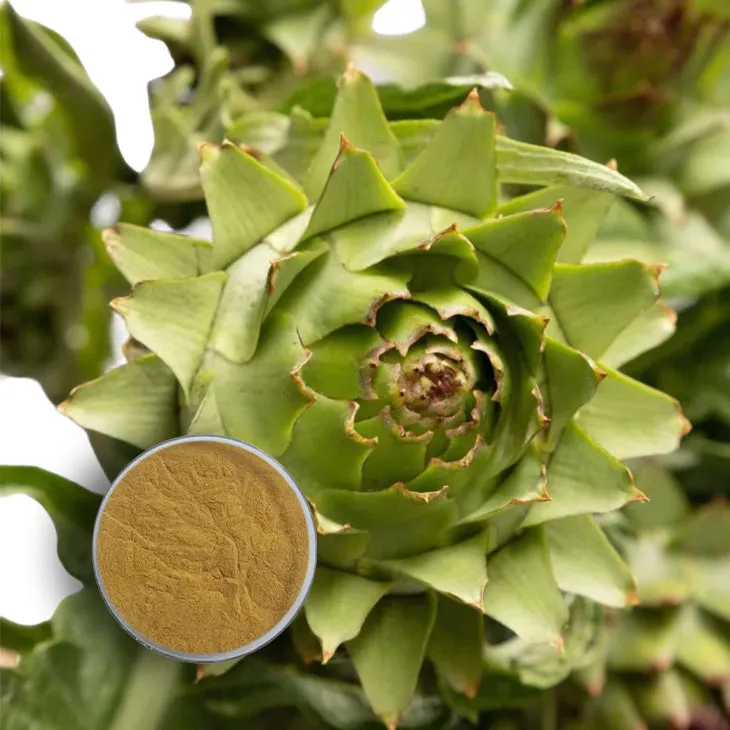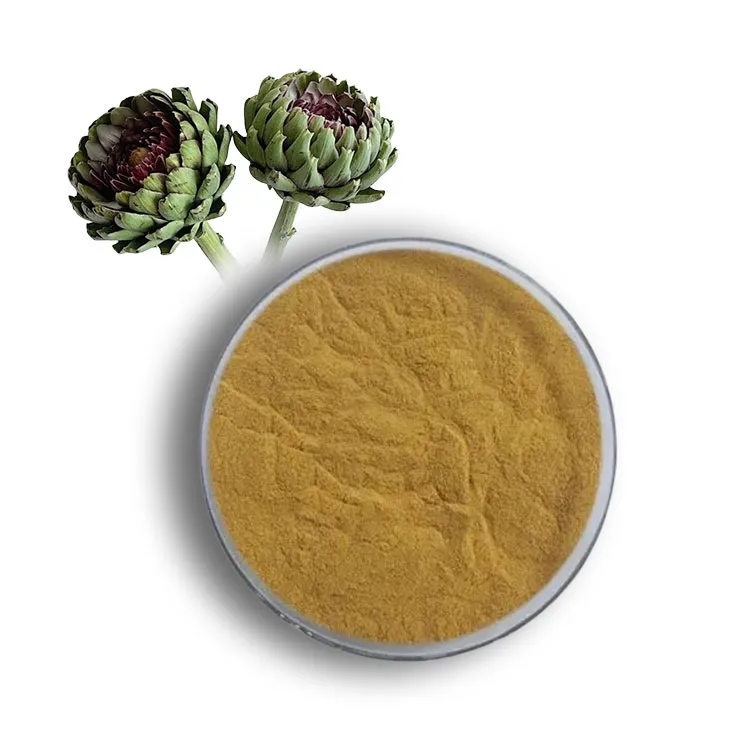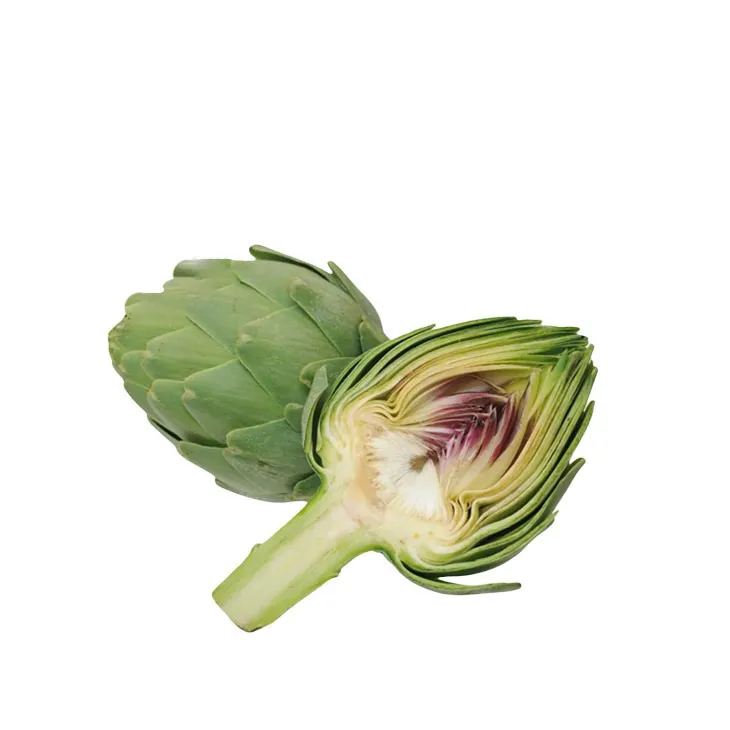- 0086-571-85302990
- sales@greenskybio.com
Active ingredients in artichoke leaf extract.
2024-11-30

Introduction
Artichoke (Cynara scolymus) has been used for centuries in traditional medicine, and Artichoke Leaf Extract is now recognized for its numerous health - related properties. This is due to the presence of a variety of active ingredients that work both independently and synergistically. Understanding these active ingredients is crucial for exploring the potential applications of Artichoke Leaf Extract in medicine, nutrition, and other fields.

Cynarin: A Key Component for Liver Health
Cynarin is one of the most prominent active ingredients in Artichoke Leaf Extract. It has been the subject of extensive research regarding its role in liver health.
Mechanism of Action on the Liver
Cynarin may contribute to liver health through multiple mechanisms. One of the main ways is by promoting bile production and flow. Bile is essential for the digestion and absorption of fats in the small intestine. By enhancing bile production, cynarin helps in the proper breakdown and utilization of dietary fats. This not only aids in digestion but also has implications for overall metabolic health.
Moreover, a healthy bile flow is important for the elimination of toxins from the liver. Cynarin - induced increased bile flow can assist in removing harmful substances such as cholesterol and other lipid - soluble toxins from the liver, reducing the risk of liver damage and disease.
Research Evidence
Several studies have provided evidence for the beneficial effects of cynarin on the liver. In animal studies, cynarin supplementation has been shown to improve liver function markers. For example, it has been associated with a reduction in levels of liver enzymes such as alanine aminotransferase (ALT) and aspartate aminotransferase (AST), which are often elevated in liver diseases.
In human studies, artichoke leaf extract containing cynarin has been investigated for its potential in treating liver disorders. Some clinical trials have reported positive outcomes in patients with non - alcoholic fatty liver disease (NAFLD). These patients showed improvements in liver fat content and liver function tests after taking artichoke leaf extract supplements.

Luteolin: Antioxidant and Anti - Inflammatory Agent
Luteolin is another important compound present in artichoke leaf extract. It is a flavonoid with significant antioxidant and anti - inflammatory activities.
Antioxidant Properties
Luteolin functions as an antioxidant by scavenging free radicals. Free radicals are highly reactive molecules that can cause damage to cells, proteins, and DNA. In the body, they are generated as a by - product of normal metabolic processes, but also due to environmental factors such as pollution, radiation, and smoking. Luteolin's antioxidant activity helps to neutralize these free radicals, thereby protecting cells from oxidative stress.
Oxidative stress is associated with a variety of health problems, including cardiovascular diseases, cancer, and neurodegenerative disorders. By reducing oxidative stress, luteolin may play a role in preventing or delaying the onset of these diseases.
Anti - Inflammatory Effects
Luteolin also exhibits anti - inflammatory properties. Inflammation is a natural immune response to injury or infection, but chronic inflammation can lead to tissue damage and various diseases. Luteolin can inhibit the activation of certain inflammatory pathways in the body. For example, it can suppress the production of pro - inflammatory cytokines such as interleukin - 6 (IL - 6) and tumor necrosis factor - alpha (TNF - α).
This anti - inflammatory action of luteolin makes it potentially useful in the treatment of inflammatory conditions such as arthritis, inflammatory bowel disease (IBD), and asthma. Some in - vitro and in - vivo studies have demonstrated the effectiveness of luteolin in reducing inflammation in these disease models.

Flavonoids: Protecting Cells from Oxidative Stress
The flavonoids present in artichoke leaf extract play a crucial role in protecting cells from oxidative stress.
Types of Flavonoids in Artichoke Leaf Extract
There are several types of flavonoids in artichoke leaf extract, including flavones, flavonols, and flavanones. Each type has its own chemical structure and biological activity. For example, in addition to luteolin (a flavone), there are other flavonoids such as apigenin (also a flavone) that contribute to the overall antioxidant capacity of the extract.
Cellular Protection Mechanisms
Flavonoids protect cells from oxidative stress through multiple mechanisms. One way is by directly scavenging free radicals, similar to luteolin. They can also upregulate the body's endogenous antioxidant defense systems. For instance, flavonoids can increase the activity of antioxidant enzymes such as superoxide dismutase (SOD), catalase (CAT), and glutathione peroxidase (GPx). These enzymes work together to neutralize free radicals and maintain the redox balance in cells.
Furthermore, flavonoids can protect cell membranes from lipid peroxidation. Lipid peroxidation is a process in which free radicals attack the lipids in cell membranes, leading to membrane damage and cell dysfunction. By preventing lipid peroxidation, flavonoids help to preserve the integrity of cell membranes and ensure normal cell function.
Synergistic Effects of Active Ingredients
The various active ingredients in artichoke leaf extract do not work in isolation but interact synergistically to produce a wide range of health benefits.
Enhanced Antioxidant Activity
When combined, the antioxidant effects of cynarin, luteolin, and flavonoids are enhanced. For example, while each component has its own ability to scavenge free radicals, together they can cover a wider range of free radical species and provide more comprehensive protection against oxidative stress. This synergistic antioxidant activity is important for maintaining overall health and preventing chronic diseases associated with oxidative damage.
Improved Liver and Cardiovascular Health
The combination of cynarin's effects on liver health and the antioxidant and anti - inflammatory activities of luteolin and flavonoids can lead to improved liver and cardiovascular health. In the liver, the promotion of bile production by cynarin, along with the anti - oxidative and anti - inflammatory actions of other components, can better protect the liver from damage and improve its function.
In the cardiovascular system, the antioxidant and anti - inflammatory properties of the active ingredients can help reduce the risk of atherosclerosis. Atherosclerosis is a condition in which plaque builds up in the arteries, leading to reduced blood flow and an increased risk of heart attack and stroke. By reducing oxidative stress and inflammation, artichoke leaf extract can potentially slow down the progression of atherosclerosis and improve cardiovascular health.
Conclusion
Artichoke leaf extract contains a rich array of active ingredients, including cynarin, luteolin, and various flavonoids. These components have diverse biological activities such as promoting liver health, acting as antioxidants, and reducing inflammation. The synergistic interactions between these active ingredients make artichoke leaf extract a promising natural product with potential applications in medicine and nutrition. Future research should focus on further elucidating the mechanisms of action of these active ingredients and exploring their potential in treating various diseases.
FAQ:
What are the main active ingredients in artichoke leaf extract?
The main active ingredients in artichoke leaf extract include cynarin, luteolin, and flavonoids. Cynarin is known for its potential to promote liver health through bile production and flow. Luteolin has antioxidant and anti - inflammatory activities, and flavonoids protect cells from oxidative stress and are relevant to cardiovascular health.
How does cynarin in artichoke leaf extract contribute to liver health?
Cynarin in artichoke leaf extract may contribute to liver health by promoting bile production and enhancing the flow of bile. This helps in the proper digestion and detoxification processes in the liver.
What is the role of luteolin in artichoke leaf extract?
Luteolin in artichoke leaf extract exhibits antioxidant and anti - inflammatory activities. It helps in reducing oxidative stress and inflammation in the body, which can have various health benefits.
How do flavonoids in artichoke leaf extract affect cardiovascular health?
Flavonoids in artichoke leaf extract play a role in protecting cells from oxidative stress. By doing so, they can contribute to cardiovascular health as oxidative stress is linked to various heart - related problems.
What is the significance of the synergistic interaction of active ingredients in artichoke leaf extract?
The synergistic interaction of active ingredients in artichoke leaf extract means that the combined effect of these components is greater than the sum of their individual effects. This makes artichoke leaf extract more effective in terms of potential health benefits, such as in promoting liver and cardiovascular health, as well as reducing inflammation and oxidative stress.
Related literature
- The Bioactive Compounds of Artichoke Leaf Extract: A Review of Their Health - Promoting Properties"
- "Artichoke Leaf Extract: Composition, Pharmacological Activities and Therapeutic Applications"
- "Active Ingredients in Artichoke (Cynara scolymus L.) and Their Potential Health Benefits"
- ▶ Hesperidin
- ▶ citrus bioflavonoids
- ▶ plant extract
- ▶ lycopene
- ▶ Diosmin
- ▶ Grape seed extract
- ▶ Sea buckthorn Juice Powder
- ▶ Beetroot powder
- ▶ Hops Extract
- ▶ Artichoke Extract
- ▶ Reishi mushroom extract
- ▶ Astaxanthin
- ▶ Green Tea Extract
- ▶ Curcumin Extract
- ▶ Horse Chestnut Extract
- ▶ Other Problems
- ▶ Boswellia Serrata Extract
- ▶ Resveratrol Extract
- ▶ Marigold Extract
- ▶ Grape Leaf Extract
- ▶ blog3
- ▶ blog4
-
High - quality lily extract products.
2024-11-30
-
Organic Clove Powder Factory.
2024-11-30
-
Chinese suppliers of chastity berry extract.
2024-11-30
-
100% Organic Aged Garlic Extract.
2024-11-30
-
Chinese Chastity Berry Extract Factory.
2024-11-30
-
Lotus leaf extract
2024-11-30
-
Yellow Pine Extract
2024-11-30
-
Aguaje Extract
2024-11-30
-
Chia Seed Powder
2024-11-30
-
Baicalin
2024-11-30
-
Saffron Extract Powder
2024-11-30
-
Eucommia Ulmoides Extract
2024-11-30
-
American Ginseng Root Extract
2024-11-30
-
Grape Seed Extract
2024-11-30
-
Citrus Aurantium Extract
2024-11-30





















